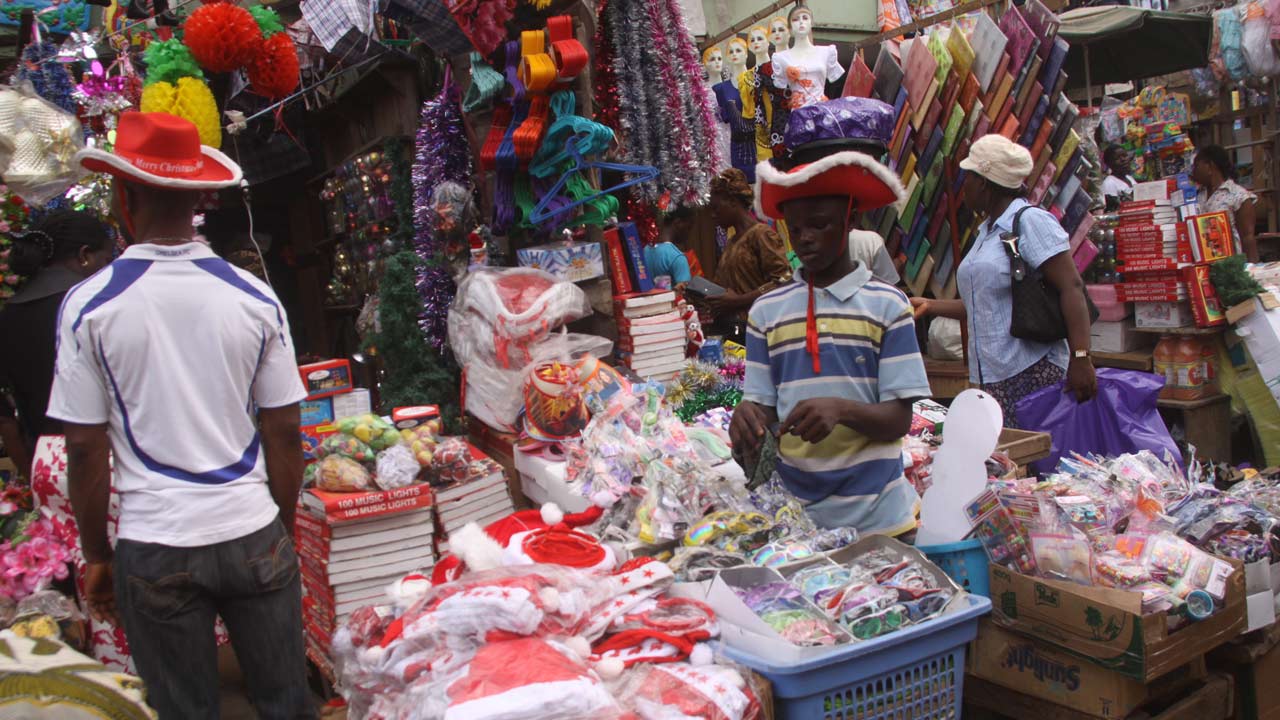As Christmas approaches, millions of Nigerians face a grim holiday season due to soaring inflation and a persistent cash scarcity that have severely impacted household budgets and dampened festive cheer.
From Agege, a popular market in Lagos, a bag of rice, which is a staple food, has risen from N90,000 to N120,000 per bag. Okra, another essential ingredient, now costs N6,000 for a paint, which was N2000 last month.
Waterleaf, a popular leafy green vegetable rich in fibre and minerals, now costs N2,000 per bunch, up from N500 last month. Crayfish, a staple ingredient in many Nigerian dishes, now costs N12,000 for one paint.
For the food commodity seller and many other Nigerians, these price hikes are a major concern. ‘I don’t know how we’ll afford to celebrate Christmas this year,’ she said.
“Many are already wondering how they’ll make ends meet and celebrate the yuletide season,” said Showunmi Adeojo, an entrepreneur based in Lagos.
According to Bamidele Akin, a driver who spoke to our correspondent, the bus fare was not as high as this. “We used to carry a passenger from Lagos to Ibadan N1,000 but now it’s N3,000. From Lagos, Ojodu-Berger Park, a trip to Ijebu-Ode before was N2,000 but now is 4,000, a 100 per cent increase.
READ ALSO: Nigerians face costly Christmas as food inflation surges above 40%
“Bus going to Abeokuta is also N4000; Sagamu fare which was N1500 is now N3,000. Sometimes, l charge N3,500 which is not a fault of mine,” says Bamidele.
Meanwhile, for passengers going to the South South region, especially, Edo and Delta State, the fare is said to be N30,000 to Edo State and N35,000 to Delta State. Hence, depending on the garages and the transport companies, the prices vary.
At Jibowu bus terminal, many would-be travellers were seen grumbling over the hike which has gone up almost three times.
A visit to Ekeson Bus Terminal Ticketing office discovered that it takes one passenger N45,000 to pay for a seat within a luxurious bus to Abuja and N47,000 to the Eastern part of the country.
With Sienna to Abuja somebody will pay between N45,000 and N60, 500, depending on the car and the company that owns it.
Inflation hits record high
Nigeria’s inflation rate, which recently climbed to 26%, has significantly eroded the purchasing power of the average citizen. Food prices, in particular, have skyrocketed, with staples such as rice, yams, and cooking oil becoming prohibitively expensive for many families.
“The rising cost of food is unprecedented,” says Dr. Olusegun Adewale, an economist at the University of Lagos.
“Inflation is driven by multiple factors, including the devaluation of the naira, high transportation costs due to fuel price hikes, and disruptions in food production caused by insecurity.”
Cash scarcity worsens economic woes
Adding to the strain is an acute cash shortage resulting from the Central Bank of Nigeria’s cashless policy and the continued withdrawal limits on cash transactions. Small business owners and informal sector workers, who rely heavily on cash for daily transactions, are particularly hard-hit.
READ ALSO: LAWMA holds 2024 Christmas carol/end of the year thanksgiving
“Even though digital payments are an option, network failures and charges on transactions make them unreliable and costly for many,” explains Bisi Ogundipe, a financial analyst. “This cash crunch has crippled economic activities in local markets, where cash is king.”
Nigerians adjust holiday plans
The combined effects of inflation and cash scarcity are forcing many Nigerians to cut back on holiday spending. Families are scaling down celebrations, opting for smaller gatherings and fewer gifts.
Retailers are also reporting slower sales compared to previous years, a trend that is further exacerbating economic challenges.
“This year, we will have a modest Christmas,” says Oluchi Okoro, a mother of three in Abuja. “We can only afford basic meals and won’t be buying new clothes for the children as we usually do.”
Experts call for immediate intervention
Economists and policy experts are urging the government to address these issues promptly. They recommend targeted subsidies for essential goods, an aggressive push to stabilize the naira, and improved implementation of monetary policies to ease the cash shortage.
“The government must act swiftly to prevent the situation from spiraling further,” warns Dr. Adewale. “The long-term economic and social consequences of this crisis could be devastating if not managed properly.”
A Bleak outlook for many
While Christmas is traditionally a time of joy and generosity, this year’s celebrations are overshadowed by economic hardships.
For many Nigerians, the holiday season will serve as a somber reminder of the challenges they face daily, with hopes that the new year will bring much-needed relief and stability.

 Entertainment1 week ago
Entertainment1 week ago
 Football1 week ago
Football1 week ago
 Business7 days ago
Business7 days ago
 Health1 week ago
Health1 week ago
 Business1 week ago
Business1 week ago
 Latest1 week ago
Latest1 week ago
 Entertainment1 week ago
Entertainment1 week ago
 Football7 days ago
Football7 days ago

